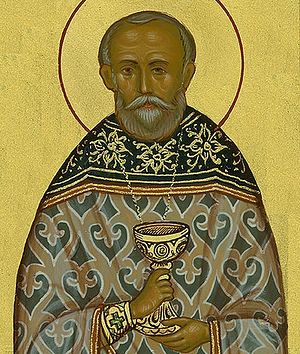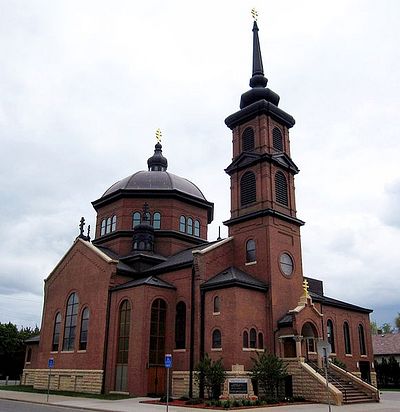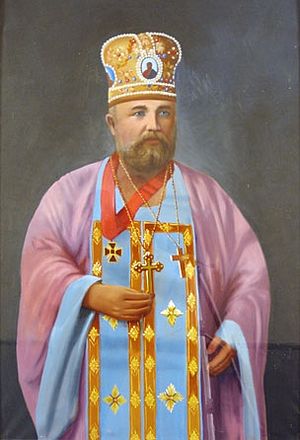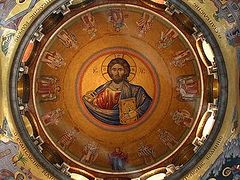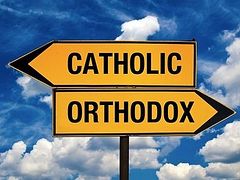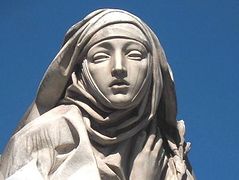"On May 6, 2014 Archimandrite Luke delivered a lecture at St. Mary's Cathedral (OCA) in Minneapolis, MN. The talk was part of an annual Saint Alexis (Toth) lecture series sponsored by the St. Mary's Boriss-Hansen Committee. St. Mary's plays a significant role in the history of Orthodoxy in America. The Cathedral altar was consecrated by St. Patriarch Tikhon and St. Alexis was the pastor of the church. The parish hall, next to the church, is located where the first Russian Orthodox seminary once stood. St. Alexis is one of the great missionary confessors of the Orthodox Church and is lauded as such in Father Luke's talk."
Text of Archimandrite Luke's Lecture:
St. Alexis, a Resolute Zealot for Orthodoxy
In light of contemporary ecumenical exchanges, dialogues, theological commissions, and dramatic statements frequently confusing and scandalizing the Orthodox faithful, we need to pause a moment and refresh our memory with the image of a prophet zealous for the Lord's truth found in the person of St Alexis, who not only resembles an Old Testament prophet but is equal in spirit to great luminaries such as Sts. Athanatious the Great, Cyril of Alexandria, Photios the Great, and Averky of Jordanville. Some might favor a different reading of his life, by excusing his words and actions as the result of a misunderstanding, an overreaction to circumstances, which we now might better understand through the prism of unfortunate historical events.
What really inspired Fr. Alexis' actions and how would he would have reacted to the presentation of the facts of his life through our compromising contemporary attitudes, may be discerned from his life and writings. “St. Alexis was born in a Carpatho-Rusyn family of priests, both his father and brother were priests and his uncle was a bishop. Like most Carpatho-Rusyns of the time, the Toths were Eastern Rite-Uniate Catholics. After completing his seminary education, he married Rosalie Mihalich, the daughter of a priest in 1878, was ordained to the priesthood and assigned as the second priest in a Greek Catholic parish. While serving there, his wife and their only child died. The critical time of Father Toth's life began with his arrival in America in November, 1889 to become the first pastor of the new Greek Catholic church in Minneapolis. Five weeks after his arrival, Father Toth met the local Roman Catholic bishop, Archbishop John Ireland. Learning that Father Toth had been married, the Archbishop refused to recognize him as a legitimate Catholic priest and forbade him to function as a priest anywhere in the Diocese.
As a professor of Canon Law, Father Toth knew his rights and continued serving the needs of his flock. In 1890, all of the Uniate priests then serving in America gathered for a meeting in Wilkes-Barre to discuss the open hostility from the local Roman Catholic hierarchy.
How did he understand his own return to Orthodoxy? “I made up my mind to do something which I carried in my heart for a long time, for which my soul longed: that is, to become Orthodox. But how was it to be done. I had to be very cautious. The unfortunate Union, the source of our decline and all our ills, had been part of our people too long. We had already borne that yoke on our shoulders for 250 years. I fervently prayed God to grant me the power to make all this clear to my unenlightened parishioners.”
After contacting the Orthodox Bishop in San Francisco, Father Toth traveled there and was received into the Orthodox Chruch by the bishop. Bishop Vladimir traveled to Minneapolis in March, 1891 and received 361 parishioners into the Orthodox Church. Through Father Alesis’ efforts, over 17 parishes returned to the Orthodox Faith and an estimated 25,000 people.
Was he acting out of pique as a result of a simple human misunderstanding or were there deeper, more profound motives behind his decision to break with Rome? Fr. Alexis' national/religious background gives us the answer. Historically the Orthodox peoples of Galicia and Carpatho-Russia had been for centuries under Polish and Hungarian rule. As a consequence, for political reasons, they were forced into union with Rome. As nationalities they were under constant pressure to become Polish or Hungarian. These peoples had not seen true, free Orthodoxy since the Union of Brest, nor had they been able to express their national Slavic identity freely since the time of Kievan Rus; nonetheless, they always preserved the consciousness that they were both Orthodox and a part of the Great Russian nation. Proof of this lays in their swift willingness to return to Orthodoxy when they were free to do so and their acknowledgement of their common national identity with Russia. Moreover, back in their native country there was growing popular support among the Uniate laity to embrace Orthodoxy. Fr. Alexis was well aware of the heritage of his ancestors, and having finished the Uniate seminary with a doctorate in canon law, he was well prepared to make a precise and educated evaluation of the situation. His thoughts on confessing true Orthodoxy are expressed in his defense of Fr. John Naumovitch of Lvov in Galicia, a former Uniate who returned to Orthodoxy in 1885 bringing many Uniates with him. Fr. John was arrested in Lvov and slandered in the American Uniate press. Fr. Alexis vehemently defended the honor of his co-patriot. The Uniate publication Vestnik stated that Fr. John Naumovitch, "…never mentioned that the people should renounce their faith and accept Orthodoxy." Fr. Alexis retorted: "What kind of shameless lie is that! Has Judas' hate killed the last drop of your conscience?? Is it possible that you wish to distort such facts as the entire world knows? Why then did Fr. John Naumovitch fight, if not for the faith and nationality? Did not the people in Hnilichki and Skolat return to Holy Orthodoxy at his call? Was that not the reason why he and those people suffered persecution and imprisonment in jails? Was it not for that that the Pope anathematized him by the rancorous Cardinal Sembratowicz, and then? Was that not the reason why the Austro-Polish governments accused him and his people of high treason ...?" These words of heartfelt defense for a fellow confessor prove that Fr. Alexis had, for a long time before his meeting with Archbishop Ireland, realized that the Vatican's real aim was to eliminate Orthodoxy, and the Archbishop's treatment of his new Uniate priest was simply a reflection of his fear of Orthodoxy even in its diluted Uniate form. To infer that Fr. Alexis left the Roman Church only because he felt offended or humiliated by the Archbishop's words at their meeting is a very serious distortion of the truth. Later, having been received into the Orthodox Church, Fr. Alexis defended himself against attacks in the following words which are further evidence of his conviction that the Unia was designed to destroy the Orthodox faith.
"Did I ever hide my program which I have used as the basis of my Orthodox missionary activity? Did I not openly teach and am I not openly teaching now that the Unia is a spiritual yoke for the Russians from Hungary and Galicia? Therefore, if we want to stay Russian (Orthodox) not only in words but in deeds, we have to free ourselves from Rome, which takes away from us our Faith, our nationality, our Church, our Cross, and our monasteries ... This is my conviction, and this is what I fight for ... Did I establish the Holy Orthodox Church and Faith ...? And if now, by the grace of God, our people have found the true Knowledge and reunite with the Holy Orthodox Church, then your shameless, lying reproach is not my denunciation; it is, in fact, turned into your own dishonor and curse ...!" Are these the sentiments of a priest uncertain of his convictions, motivated by petty spite or passion? No, they are the outpourings of the heart of an Orthodox zealot.
Persecution continued in his homeland with countless victims including St. Maxim Sandovitch martyred in 1914, and the Priest Ignatii Gudima who was incarcerated in the concentration camp Talergof for his witness, who reposed in 1944 — yet to be canonized.
Fr. Alexis was accused of being motivated by self-interest and personal gain. Although there was a stipend granted by the Holy Synod of the Russian Church for the reunited parishes, a close examination of the sums involved demonstrates that they were too small to have been an attraction. The Russian Church sent only a few priests to serve the parishes, the majority of priests came from the parishes themselves. Candidates were sent to a special seminary established to train them. Gain was not a factor. Self-interest and love of glory are unfounded accusations. The story of Fr. Alexis' life reads like that true apostle. He suffered from constant weariness, endless travels labors, was frequently without funds or help, and was constantly attacked by the enemies of Orthodoxy. The independence of his actions, devoid of any outside influence is attested by the historian, Professor Vasilly Alexeev in his article, The History of Orthodoxy in the U.S.A. He writes: “It is important to emphasize that this first switch-over of an entire Uniate parish to Orthodoxy occurred without interference or being prepared from outside, but in accordance with the free and not-too-hasty decision of the parishioners themselves, whose ancestors had lived on the territory of Kievian Rus many centuries ago, but had never been part of Moscovitevite Russia, and who for centuries had belonged to the Uniate Church . . . The cross-over of the Uniates to Orthodoxy was carried out through the Consul General in San Francisco, whose mediation the parishioners of St. Mary's requested. The next stage was a correspondence with the Russian Orthodox bishop Vladimir in the United States, who visited Minneapolis. On 25 March 1891, the parishioners and priest of St. Mary's converted to Orthodoxy. The parishioners then celebrated the day as the Triumph of Orthodoxy in America. The courage of the parishioners is acknowledged by history as a triumph of the Orthodox faith.”
Father Alexis wrote to Bishop Nicholas, “…for seven years I am in a real battle, I suffer profanation, contempt, defamation from others and from my own people!—Without any ulterior motives I united with Orthodoxy, about which I already dreamed about in the Old Country.”
Fr. Alexis was not confused about nor did he lack knowledge concerning the errors of the Papacy. In order to educate his flock and offer proof of his own understanding of the subject he wrote a lengthy catechism entitled "Where to Seek the Truth." He used questions and answers to make the information more accessible to, his readers. He answered such questions as "What do the words 'schism' and 'heretical' mean? Can we call the pope Christ's successor? Did Christ, the Apostles, the Holy Fathers, or the Holy Councils teach or write anything about infallibility? What does the Unia consist of?" etc.
Although not directly. connected with the subject of this talk, a comment should be made on Fr. Alexis' devotion to the Russian Church. Fr. Alexis felt a profound love for the Russian Church, nation, and Tsar, although he never lived in the Empire. Whenever the honor of the Russian Church or nation were defamed he rushed to their defense. He not only brought his followers under the administration of the Russian Church but also educated them in the spirit and culture of Russia. Nor was this love for Russia incompatible with his loyalty to his new homeland. He was very much aware that it was only thanks to the freedom that he and his followers enjoyed under the American flag that they were able to fulfill their historic longings. He encouraged his people to use this freedom to develop their religious and ethnic character. Why does he appear so nationalistic with regard to everything Russian? For practical reasons (not excluding his own sincere and genuine feelings) it was propitious to unite his followers in body and spirit under the Russian Church and ethos. The reasons he explains in his own words with reference to the Tsar: "Each true Russian, even if he is not the Tsar's citizen, every person who has even one drop of Slavic blood, has to pray for his health and his Royal House because the Russians and the Slavs have in the Tsar their only protector on this planet." The Carpatho-Galician people were persecuted because of their nationality and their faith. It is precisely because of this that they needed both the protection and the moral support of Russia. For this reason Fr. Alexis emphasized solidarity with Russia, established Russian schools, and advised the people to preserve their old customs. Union of faith, language, and customs gave the people a sense of identity which rooted them in their Orthodoxy. To advocate a separatist movement based on the creation of a Carpatho-Galician-Ukranian church and state was to him absurd and unthinkable. He understood the dangers of separation and division and attributed such movements to Orthodoxy's enemies. In his work "The Statistics of the Greek Catholics," he prophetically underlines the disastrous results of separatism for the Slavic-Orthodox peoples. "No matter what the popes did, or their praetorians, the hordes of Jesuits, Dominicans, and Polish ksendzes, and the 'Rzecz Pospolita' (Poland) to poison all Russians with Unia it was in vain!... Unia did not take root even until today: it is a branch cut from Orthodoxy, and can be supported only by artificial methods ... To attract the Russian Orthodox Church to Unia was and still is the greatest wish of the Roman Pontiffs . . . Truly: the center of Orthodoxy today is the Russian Orthodox Church: if it should kneel to the Pontifex-Pope, then the entire Ecumenical Church would also bend its head to him. But the Lord's Providence will never permit that!" Both contemporary Orthodox and Roman Catholic sources comment upon and confirm the fulfillment of these prophetic words. It is curious that recently threatened by forced Ukrainization, something alien both culturally and spiritually, the Carpatho-Russians have petitioned Mr. Vladimir Putin to take them under his protection.
Contrary to the opinion that St. Alexis and his rift with his Catholic bishop is similar to the falling away of the Catholic Church in 1054, both, some claim are the result of a simple misunderstanding, God's will was certainly manifest. If Archbishop Ireland had not provided the catalyst, then Fr. Alexis' thinking might not have been forced to the logical conclusion. If the event in 1054 had not taken place between East and West, the entire Christian world would have been infected by the spread of Papal power and Latin errors.
St. Alexis comments on this lamentable event in 1054 in terms no one can doubt concerning his personal position, “The West was in a state of ignorance at the time the Pope separated himself from the Orthodox Catholic Church; the political circumstances were very complex; this played into the hands of the Popes. God, according to His limitless Grace, permitted such malicious deeds by “Christ’s Vicar” but finally, came the formidable finger of God!—Luther, Calvin and other Reformers turned millions of people away from the Papacy; the Catholic Italian king took the Pope’s lands away from him; the glory, power, and pride was gone forever!...Yes, the limitless pride of the Popes is responsible for the appearance of Protestantism and Christian disunity and is the reason for the existence of so many Christian sects in the world—and such materialism, and liberalism and loss of faith…!”
Love for truth is the main issue involved in both cases. Fr. Alexis, a priest devoted to the truth, would indeed be perplexed by the way some might choose to reinterpret his life and struggles. He laid the foundations for Orthodoxy's future in America—free from error and grounded in a firm tradition. It is obvious from his writings that he never would have embraced Ecumenism.
What do we conclude from his life as a guidepost for the present? St. Alexis reflects the uncompromising spirit of the Gospels, where our Lord plainly forgives His personal enemies and repentant sinners, but never the enemies of God's truth and the Church. St. Alexis, likewise follows clearly in the footsteps of those luminaries of our Holy Patristic Tradition who never compromised with heresy and falsehood. His witness is the antithesis of our contemporary politically correct and wordily desire to please men, create a kitchen talk theology, and readers digest reading of the Church cannons. He accurately defined the boundaries of the Church denouncing all innovations which are presented in our times as something new, better, revised, renewed, if not simply more convenient.
It is seems to me imperative to focus on the truth as he understood it, in order to find and maintain our spiritual equilibrium, even if it is necessary to sometimes exaggerate a point or express the truth with more assertiveness and zeal as did many fathers in the past, St Augustine for example in his struggle against Donatism, or St John of Kronstadt who has no qualms of warning us about the fires of hell. The media and popular entertainment if not openly hostile to the truths of Christianity, gloss over them or present them in the rosy tones of an all forgiving benevolent Force in the sky who celebrates and rewards some sort of nebulous goodness in people regardless of their beliefs and lifestyle.
There is no need to make excuses for St. Alexis or reinterpret his powerful witness, we need only humbly accept and follow his direction.
Thank you.

